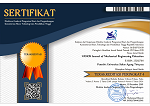A Study on The Effect of Class of Honda Program on The Student’s Self-Efficacy in The Vocational High Schools in Yogyakarta
Abstract
Vocational High Schools have to develop a good partnership with industry in order to prepare their graduates to be ready to work in certain areas of expertise, study in a higher education, or become an entrepreneur. One form of cooperation between vocational schools and industry is the special Honda class program. This program was implemented in more than 343 vocational high schools since 2015 by PT. Astra Honda Motor. It was developed as one of PT. Astra Honda Motor programs to support the development of vocational education in Indonesia. Therefore, this study aims to identify the self-efficacy of students in a special Honda class. This study used a descriptive method with a total sample of 219 from a total population of 647 students. Collecting data using a questionnaire. The results showed that the students' self-efficacy levels were high (18%) moderate (67%), and low (16%). The highest factor influencing student self-efficacy is the psychological state or student’s ability to control their emotions (4.22) and the lowest is vicarious experience or student’s belief in being able to do something based on observations of others (2.48).
Keywords
Full Text:
PDFReferences
UNESCO.“Technical and Vocational Education and Training for the Twenty first Century,” 2002. Accessed: Dec. 06, 2021. [Online]. Available: http://unesdoc.unesco.org/images/0012/001260/126050e.pdf .
LAWS OF THE NATIONAL EDUCATION SYSTEM. Indonesia, 2003.
Badan Pusat Statistik, “Number of vehicle engine 1994-2013,” Nov. 30, 2015. From http://www.bps.go.id/index.php/linkTabelStatis/1425.
Datapokok ditpsmk, “Data Pokok SMK,” Nov. 30, 2015. from http://datapokok.ditpsmk.net/.
O. O. Kennedy, “Strategies in Improving the Policy and Access to Technology Education in Secondary Schools in Nigeria,” European Journal of Applied Sciences, vol. 3, no. 1, pp. 24–29, 2011.
P. Sugiarto, “Asian Leadership: conversations with prijono sugiarto,” hqasia.org. , Nov. 30, 2015.
Bandura, Albert Pastorelli, Concetta Barbaranelli, Claudio Caprara, Gian VittorioBandura, and Albert Pastorelli, “Self-efficacy pathways to childhood depression,” Journal of Personality and Social Psychology, vol. 76, no. 2, pp. 258–269, 1999.
A. O. G. Beverborg, P. J. C. Sleegers, and K. van Veen, “Promoting VET teachers’ individual and social learning activities: The empowering and purposeful role of transformational leadership, interdependence, and self-efficacy,” Empirical Research in Vocational Education and Training, vol. 7, no. 1, pp. 1–20, 2015, doi: 10.1186/s40461-015-0018-4.
C. A. Young, R. J. Mills, J. Woolmore, C. P. Hawkins, and A. Tennant, “The unidimensional self-efficacy scale for MS (USE-MS): Developing a patient based and patient reported outcome,” Multiple Sclerosis Journal, vol. 18, no. 9, pp. 1326–1333, 2012, doi: 10.1177/1352458512436592.
Alexander J Rothman, Austin S Baldwin, Andrew W Hertel, and Paul Fuglestad, Self-regulation and behavior change: Disentangling behavioral initiation and behavioral maintenance. New York: Guilford press, 2004.
J. A. Linde, A. J. Rothman, A. S. Baldwin, and R. W. Jeffery, “The impact of self-efficacy on behavior change and weight change among overweight participants in a weight loss trial,” Health Psychology, vol. 25, no. 3, pp. 282–291, May 2006, doi: 10.1037/0278-6133.25.3.282.
B. S. Randhawa, J. E. Beamer, and I. Lundberg, “Role of Mathematics Self-Efficacy in the Structural Model of Mathematics Achievement,” Journal of Educational Psychology, vol. 85, no. 1, pp. 41–49, 1993, doi: https://doi.org/10.1037/0022-0663.85.1.41.
Helen Patrick and Lyley Hicks, “Relations of perceived social efficacy and social goal pursuit. Journal of Early Adolescence,” Journal Of Early Adolescense, vol. 17, no. 2, pp. 108–128, 1997, doi: https://doi.org/10.1177/0272431697017002001.
B. J. Zimmerman, Self-efficacy and educational development. Cambridge: Cambridge University Press, 1995. [Online]. Available: https://www.researchgate.net/publication/247480203.
M. L. Peters and K. Kortecamp, “Rethinking Undergraduate Mathematics Education: The importance of classroom climate and self-efficacy on mathematics achievement,” Current Issues in Education, vol. 13, no. 4, 2010, [Online]. Available: http://cie.asu.edu/.
C. J. Heffernan, “Social foundations of thought and action: A social cognitive theory, Albert Bandura Englewood Cliffs, New Jersey: Prentice Hall, 1986, xiii + 617 pp. Hardback. US$39.50.,” Behaviour Change, vol. 5, no. 1, pp. 37–38, Mar. 1988, doi: 10.1017/s0813483900008238.
J. Kitching, S. Cassidy, P. Eachus, and P. Hogg, “Creating and Validating Self-Efficacy Scales for Students,” RADIOLOGIC TECHNOLOGY, vol. 83, no. 1, 2011.
C. L. Barry and S. J. Finney, “Can We Feel Confident in How We Measure College Confidence?: A Psychometric Investigation of the College Self-Efficacy Inventory,” Measurement and Evaluation in Counseling and Development, vol. 42, no. 3, pp. 197–222, Oct. 2009, doi: 10.1177/0748175609344095.
J. Fu Dissertation, “THE RELATIONSHIPS AMONG SELF-EFFICACY, ACHIEVEMENT MOTIVATION, AND WORK VALUES FOR REGULAR FOUR-YEAR UNIVERSITY STUDENTS AND COMMUNITY COLLEGE STUDENTS IN CHINA,” 2011.
E. L. Usher and F. Pajares, “Sources of self-efficacy in mathematics: A validation study,” Contemporary Educational Psychology, vol. 34, no. 1, pp. 89–101, Jan. 2009, doi: 10.1016/j.cedpsych.2008.09.002.
R. K. Hambleton and H. J. Rogers, “Detecting potentially biased test items: Comparison of irt area and mantel-haenszel methods,” Applied Measurement in Education, vol. 2, no. 4, pp. 313–334, 1989, doi: 10.1207/s15324818ame0204_4.
Chusniyah, Tutut, and Ardiningtias Pitaloka, “Analisis Wacana pada Media Internet terhadap Optimisme dan Harapan tentang Masa Depan Indonesia,” Jurnal Sains Psikologi, vol. 2, no. 2, pp. 67–81, 2012.
DOI: http://dx.doi.org/10.30870/vanos.v6i2.11542
Refbacks
- There are currently no refbacks.

This work is licensed under a Creative Commons Attribution 4.0 International License.


.png)
.png)
